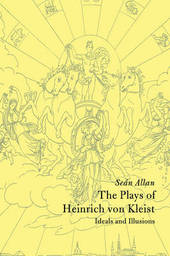
|
The Plays of Heinrich von Kleist: Ideals and Illusions
Hardback
Main Details
Description
This is a new and accessible study of the plays of Kleist (1777-1811), who ranks with Goethe and Schiller amongst nineteenth-century authors and who has been a major influence on contemporary German writers. Sean Allan examines Kleist's critique of the aspirations of both Enlightenment and Romantic metaphysics, notably his suggestion that the pursuit of 'transcendent' ideals of perfection constitutes a formidable obstacle to genuine progress in human affairs. In so doing, he offers resolutions of a number of long-running controversies in Kleist criticism, as well as summarising the state of research on all the plays. The book includes discussion of two plays usually neglected by scholars: Das Kathchen von Heilbronn and Die Hermannsschlacht. All quotations are given in both German and English and full references are given to published English translations of Kleist's works as well as to the German originals.
Reviews"...a comprehensive and reliable guide to Kleist's plays and to recent scholarly discussion of them. His command of the texts and Kleist's correspondence and critical writings is complete and his perspective balanced...An important source for all students, from undergraduates with no knowledge of German to graduate students and other scholars." Choice "The introduction contains a valuable summary of the current state of research. Also included are a useful chronology of Kleist's life and works, as well as an index of works and names that excludes proper names from Kleist's works themselves. The thorough bibliography will be of help to scholars in the area. The general reading public will find the book a well written, readable introduction to the plays of Kleist." Philip Mellen, Germanic Notes and Reviews "Sean Allan's book will serve as an introduction to Heinrich von Kleist and his plays." Marjorie Gelus, Monatshefte "...this book offers a very readable and thought-provoking introduction to the versatility of Kleist's dramatic genius and his oppositional stance within the idealist frameworks of his time." Bernd Fischer, Modern Philology
|